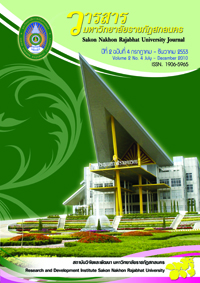สมรรถนะผู้บริหารโรงเรียนที่ส่งผลต่อประสิทธิผลการบริหารโรงเรียน สังกัดสำนักงานเขตพื้นที่การศึกษาในจังหวัดนครพนม
Abstract
บทคัดย่อ
การวิจัยครั้งนี้มีวัตถุประสงค์เพื่อศึกษาและเปรียบเทียบสมรรถนะผู้บริหารและประสิทธิผลการ บริหารโรงเรียน สังกัดสำนักงานเขตพื้นที่การศึกษาในจังหวัดนครพนม ตามการรับรู้ของผู้บริหาร ครูผู้สอน และประธานคณะกรรมการสถานศึกษาขั้นพื้นฐาน จำแนกตามสถานภาพการดำรงตำแหน่งและช่วงชั้นที่เปิด สอน กลุ่มตัวอย่างในการวิจัยประกอบด้วยผู้บริหารโรงเรียน จำนวน 89 คน ครูผู้สอน จำนวน 197 คนและ ประธานคณะกรรมการสถานศึกษาขั้นพื้นฐาน จำนวน 89 คน ซึ่งได้มาด้วยวิธีการสุ่มแบบหลายขั้นตอน เครื่องมือที่ใช้ในการวิจัยเป็นแบบสอบถามที่ผู้วิจัยสร้างขึ้น ด้านสมรรถนะผู้บริหารมีค่าอำนาจจำแนกระหว่าง 0.42–0.81 และค่าความเชื่อมั่น เท่ากับ 0.94 ด้านประสิทธิผลการบริหารโรงเรียน มีค่าอำนาจจำแนกระหว่าง 0.41–0.65 และค่าความเชื่อมั่น เท่ากับ 0.92 วิเคราะห์ข้อมูลด้วยการหา ร้อยละ ค่าเฉลี่ย ค่าเบี่ยงเบนมาตรฐาน การวิเคราะห์ความแปรปรวนทางเดียวการหาค่าสัมประสิทธิ์สหสัมพันธ์อย่างง่ายแบบเพียร์สันและการวิเคราะห์ ถดถอยพหุคูณทีละขั้นตอน
ผลการวิจัยพบว่า 1)สมรรถนะผู้บริหารโรงเรียน ตามความคิดเห็นของผู้บริหาร ครูผู้สอนและ ประธานคณะกรรมการสถานศึกษาขั้นพื้นฐานในโรงเรียน สังกัดสำนักงานเขตพื้นที่การศึกษาในจังหวัด นครพนม อยู่ในระดับมาก 2)ประสิทธิผลการบริหารโรงเรียน ตามความคิดเห็นของผู้บริหาร ครูผู้สอนและ ประธานคณะกรรมการสถานศึกษาขั้นพื้นฐานในโรงเรียน สังกัดสำนักงานเขตพื้นที่การศึกษาในจังหวัด นครพนม อยู่ในระดับมาก 3)สมรรถนะผู้บริหารโรงเรียน ตามความคิดเห็นของผู้บริหาร ครูผู้สอนและประธาน คณะกรรมการสถานศึกษาขั้นพื้นฐานในโรงเรียน สังกัดสำนักงานเขตพื้นที่การศึกษาในจังหวัดนครพนม ไม่ แตกต่างกัน 4)สมรรถนะผู้บริหารโรงเรียน ตามความคิดเห็นของผู้บริหาร ครูผู้สอนและประธานคณะกรรมการ สถานศึกษาขั้นพื้นฐานในโรงเรียน สังกัดสำนักงานเขตพื้นที่การศึกษาในจังหวัดนครพนม ที่เปิดสอนช่วงชั้น ต่างกัน ไม่แตกต่างกัน 5)ประสิทธิผลการบริหารโรงเรียน ตามความคิดเห็นของผู้บริหาร ครูผู้สอนและประธานคณะกรรมการสถานศึกษาขั้นพื้นฐานในโรงเรียน สังกัดสำนักงานเขตพื้นที่การศึกษาในจังหวัด นครพนม ไม่แตกต่างกัน 6)ประสิทธิผลการบริหารโรงเรียนตามความคิดเห็นของผู้บริหารครูผู้สอนและ ประธานคณะกรรมการสถานศึกษาขั้นพื้นฐานในโรงเรียนสังกัดสำนักงานเขตพื้นที่การศึกษาในจังหวัด นครพนม ที่เปิดสอนช่วงชั้นต่างกัน ไม่แตกต่างกัน 7)สมรรถนะผู้บริหารโรงเรียนและประสิทธิผลการบริหาร โรงเรียน สังกัดสำนักงานเขตพื้นที่การศึกษาในจังหวัดนครพนมมีความสัมพันธ์กันทางบวก อย่างมีนัยสำคัญ ทางสถิติที่ระดับ 0.01 8)สมรรถนะผู้บริหารโรงเรียนที่สามารถพยากรณ์ประสิทธิผลการบริหารโรงเรียน สังกัด สำนักงานเขตพื้นที่การศึกษาในจังหวัดนครพนม ได้อย่างมีนัยสำคัญทางสถิติ มี 8 ตัว คือ การนิเทศและการ ประเมินผล การยืดหยุ่นและพร้อมที่จะปรับเปลี่ยนเพื่อองค์กร การจูงใจหรือความสามารถในการสร้างทิศทาง ด้วยตนเอง การประสานงาน การให้ความร่วมมือเพื่อพัฒนาวิชาชีพ ความสามารถการในโน้มน้าวสมาชิกให้ ทำงานจนประสบผลสำเร็จ ความสามารถในการประเมินและวินิจฉัยสถานการณ์ได้อย่างถูกต้อง แม่นยำและ ความสามารถในการบริหารตนเอง 9)สมรรถนะผู้บริหารโรงเรียน สังกัดสำนักงานเขตพื้นที่การศึกษาในจังหวัด นครพนม ด้านที่ต้องหาแนวทางพัฒนาประกอบด้วย ด้านการทำงานเป็นทีม ด้านการจูงใจหรือความสามารถใน การสร้างทิศทางด้วยตนเอง ด้านความคิดสร้างสรรค์ในการแก้ปัญหา ด้านการประสานงาน ด้านความยืดหยุ่น และพร้อมที่จะปรับเปลี่ยนเพื่อองค์กร ด้านการให้ความร่วมมือเพื่อพัฒนาวิชาชีพ ด้านความสามารถในการ เรียนรู้ ด้านความสามารถในการบริหารตนเองด้านยุทธวิธีทำให้สมาชิกปฏิบัติงานให้สำเร็จอย่างมีประสิทธิภาพ ด้านความสามารถในการประเมินและวินิจฉัยสถานการณ์ได้อย่างถูกต้อง แม่นยำ ด้านความสามารถในการ บริหารความขัดแย้งให้เกิดประโยชน์สูงสุดแก่องค์การ ด้านความสามารถในการคิดและวางแผนกลยุทธ์ ด้าน ความสามารถในการโน้มน้าวสมาชิกให้ทำงานประสบผลสำเร็จ ด้านการประเมินผู้เรียนและด้านการนิเทศและ การประเมินผล
Abstract
The purposes of this research were to study and compare the school administrators’ competencies and the administration effectiveness of schools under the Offices of Nakhon Phanom Educational Service Area according to the perception of school administrators, teachers, and presidents of School Basic Education Committees, all of which were classified by their positions and key stages of education provided by the schools. Samples of the study; selected by multi-stage random sampling; consisted of 89 school administrators, 197 teachers, and 89 presidents of school basic education committees. Instrument used to collect data was a set of questionnaires which included 2 parts – the first part’s questions of which discrimination power and reliability were 0.42-0.81 and 0.94 respectively, were about competencies of school administrators; whereas those of the second part with the discrimination power of 0.41-0.65 and the reliability of 0.92, were about the administration effectiveness of the schools. Statistics used for data analysis were the percentage, mean, standard deviation, One-Way Analysis of Variance, Pearson’s Product Moment Correlation Coefficient, and Stepwise Multiple-Regression Analysis.
The findings of the study were as follows : 1) Competencies of school administrators as a whole were at the high level according to the opinions of school administrators, teachers, and presidents of School Basic Education Committees of schools under the Offices of Nakhon Phanom Educational Service Area. 2) The administration effectiveness of schools as a whole were at the high level according to the opinions of school administrators, teachers, and presidents of School Basic Education Committees of schools under the Offices of Nakhon Phanom Educational Service Area. 3) Competencies of school administrators were not different among the opinions of school administrators, teachers, and presidents of School Basic Education Committees of schools under the Offices of Nakhon Phanom Educational Service Area. 4) Competencies of school administrators were not different among the opinions of school administrators, teachers, and presidents of School Basic Education Committees of the schools with different key stages of education provided. 5) The administration effectiveness of each school was not different among the opinions of school administrators, teachers, and presidents of School Basic Education Committees of schools under the Offices of Nakhon Phanom Educational Service Area. 6) The administration effectiveness of each school was not different among the opinions of school administrators, teachers, and presidents of School Basic Education Committees of the schools with different key stages of education provided. 7) Competencies of school administrators and the administration effectiveness of schools under the Offices of Nakhon Phanom Educational Service Area enjoyed a statistically positive relationship at the significant level of .01. 8) Eight competencies of school administrators that, in statistics, could significantly predict the administration effectiveness of schools under the Offices of Nakhon Phanom Educational Service Area were ability to supervise and evaluate, flexibility and readiness to changes for the sake of the organization, self-motivation or self-directedness, coordination, cooperation for professional development, ability to persuade the members to efficiently complete the work, ability to accurately assess and diagnose situations at hand, and selfmanagement ability. 9) Areas of Competencies of school administrators under the Offices of Nakhon Phanom Educational Service Area that need to be developed are teamwork, self-motivation or selfdirectedness, problem-solving creativeness, coordination, flexibility and readiness to change for the sake of the organization, cooperation for professional development, ability to learn, self-management ability, strategies to encourage the best performance of the members, ability to accurately assess and diagnose situations at hand, ability to manage the conflicts for the maximum benefit of the organization, ability to think and plan strategically, ability to persuade the members to efficiently complete the work, ability to assess the students’ learning, and ability to supervise and evaluate. However, all guidelines for development were already suggested in the research.









